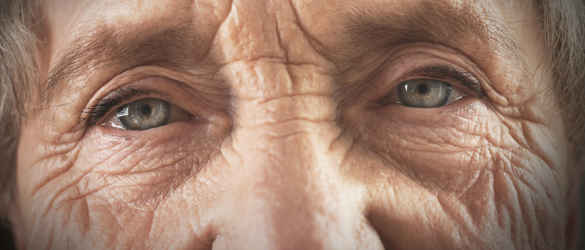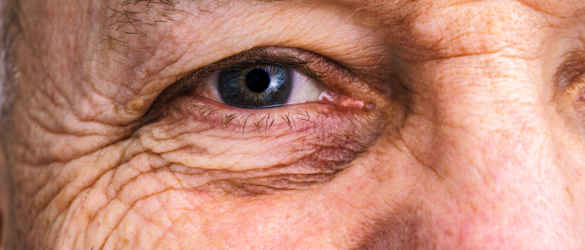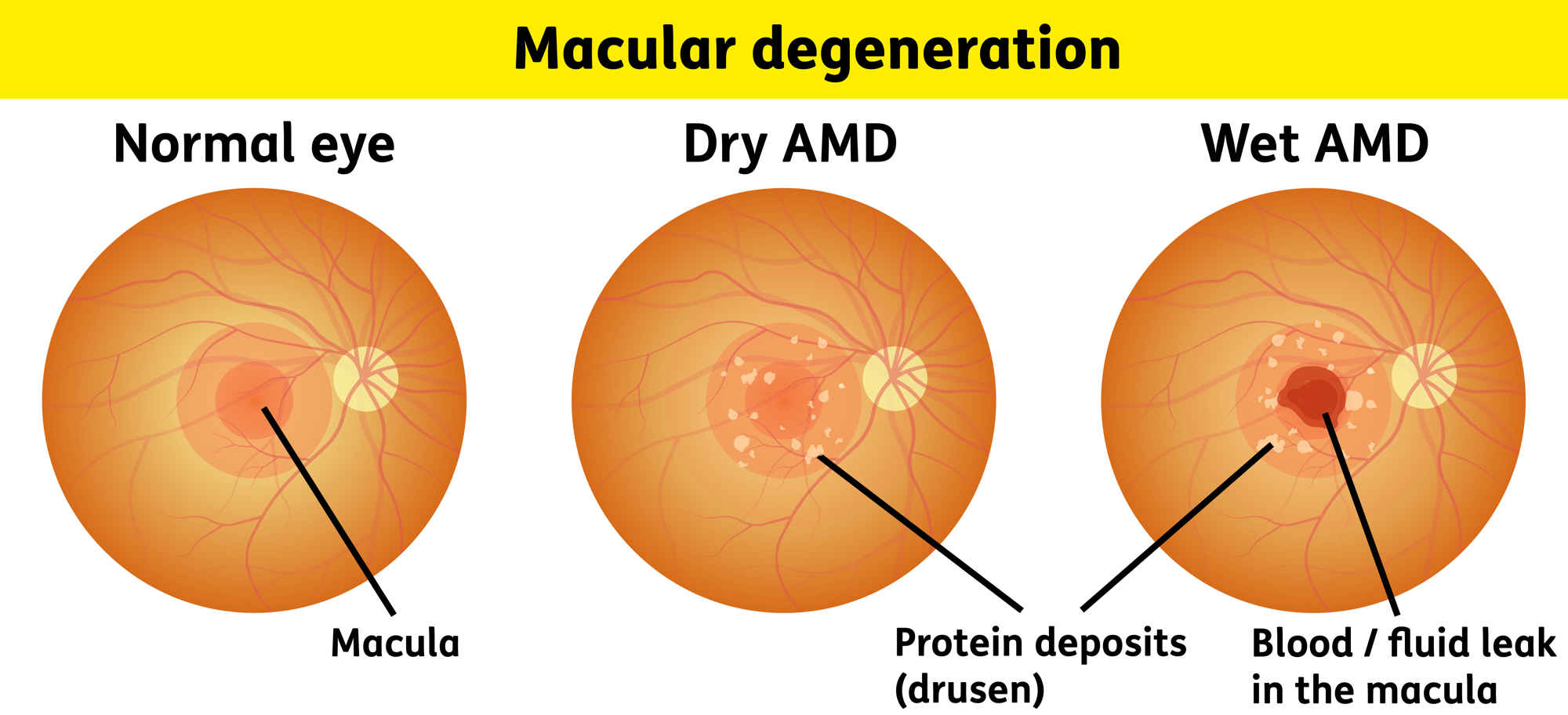What is macular degeneration?
Macular degeneration, also referred to as age-related macular degeneration (AMD), is a progressive eye condition that affects the central part of the retina known as the macula.
The macula is responsible for sharp, detailed vision used in everyday tasks such as reading, driving, and recognising faces.
AMD often begins with small changes at the back of the eye, such as the appearance of fatty protein deposits called drusen. The condition can cause you to lose your central vision, but it doesn't lead to total blindness because your side (peripheral) vision is usually unaffected.
Macular degeneration can impact one or both eyes with varying levels of severity.
Who does age-related macular degeneration affect?
As the name suggests, AMD is more likely to occur as you get older, although younger people can develop macular degeneration too.
It usually affects people over 50 and is the biggest cause of sight loss in the UK, affecting around 700,000 people.
The older we are, the greater our risk of developing the condition. Around one in every 200 people has AMD at 60.
However, by the age of 90 it affects one in five people. We are, on average, living longer so the number of people affected is increasing.
Types of macular degeneration
Dry age-related macular degeneration (AMD)
Dry AMD is a gradual deterioration of the macula as the retinal cells die off and are not renewed. Late-stage dry AMD is now also being referred to as geographic atrophy (GA).
Wet age-related macular degeneration (AMD)
Wet AMD develops when abnormal blood vessels grow into the macula. These leak blood or fluid which leads to scarring of the macula and rapid loss of central vision.
Other macular conditions may also be degenerative such as Stargardt disease, Best disease, and pattern dystrophies. Like AMD, these inherited or early-onset conditions may lead to central vision loss and gradual decline in sight.
Is your sight at risk?
Worried you might be at risk of macular disease?
Just answer five simple questions and we'll estimate your risk of age-related macular degeneration (AMD). It'll only take a minute, and it could make a world of difference to your sight.
Check your riskCauses of age-related macular degeneration
The cause of AMD is not known but there are a number of factors associated with the development of the condition.
Age
Age is the main risk factor. As we age, cell regeneration reduces. This increases the risk of developing the condition.
Genetics
A family history of macular degeneration will increase your chances of developing AMD.
Smoking
Smoking damages blood vessels and the structure of the eye. Smokers are up to four times more likely to develop AMD than non-smokers. If you also have a particular common gene for AMD you are 20 times more likely to develop the condition if you smoke.
Stopping smoking after you have developed AMD can also help reduce the risk of your eye condition getting worse. For more information on how smoking can increase the risk of developing AMD, please see our Smoking and sight loss page.
Diet
A poor diet low in fruit and vegetables may increase the risk of AMD. Antioxidants and other substances in fruit and vegetables protect the body against the effects of ‘free radicals’. These are unstable molecules that damage cells or prevent cell repair.
Alcohol destroys antioxidants. Obesity and a diet with lots of sugars and hydrogenated or saturated fats also increases the risk of developing AMD. You can read more about this by seeing our Nutrition page.
Blood pressure
People with high blood pressure are one-and-a-half times more likely to have AMD than those with normal blood pressure.
Gender
AMD affects men and women equally. Women typically live longer than men, so more women are diagnosed with AMD.
What are the symptoms of age-related macular degeneration?
AMD often develops gradually, and many people don’t even know they have it as they often don’t show any symptoms in the early stages.
As the condition progresses, symptoms may include:
- Blurry or fuzzy central vision
- Straight lines appearing wavy or distorted
- Difficulty recognising faces
- Difficulty seeing in low light
- Dark or empty spots in the centre of vision
- Trouble reading, driving, or doing close-up work
Diagnosis and tests
Early detection is key to slowing vision loss. Diagnosis usually involves:
- A comprehensive eye test, which includes a dilated eye exam to check the retina
- Amsler grid test to detect vision changes like wavy or missing lines
- Optical coherence tomography (OCT) scan, which uses light waves to create cross-section images of the retina
- Fluorescein angiography, which highlights blood vessels in the retina to detect leaks or abnormal growth
These tests help eye care specialists determine the type and stage of AMD.
Regular eye exams can help detect early signs of AMD, even before noticeable vision problems occur.
Many high street opticians now have sophisticated eye scanning machines, called OCT scanners, which are helping to diagnose more people with early stages of AMD.
People over 60 are entitled to free eye tests. An eye test is recommended every two years if you are over 60, and every year if you are over 70. Examination of the macula is a part of this free examination, however, OCT scans that take photos of the macula may be an additional fee.
Treatment options
While there’s no cure for macular degeneration, there are a number of treatments that can slow progression and improve your quality of life.
Wet AMD treatments
Since the first drug for wet AMD was approved in 2008, several more have become available.
The most effective treatment for wet AMD is anti-VEGF injections, specifically drugs like Lucentis, Eylea, Beovu and Vabysmo, which stop abnormal blood vessel growth.
Dry AMD treatments
There is currently no known cure for dry AMD, but several approaches can help manage the condition and potentially slow its progression.
These include lifestyle changes like quitting smoking and getting regular exercise, nutritional supplements like the AREDS2 formula, vision aids, and having a diet rich in antioxidants which are contained in foods like leafy greens and certain vegetables.
Living with macular degeneration
Many people with macular degeneration continue to live active, fulfilling lives with proper care and support.
Managing the condition involves lifestyle adjustments and support to maintain independence and mental wellbeing:
- Low vision aids – such as magnifying devices, large-print materials and screen readers
- Vision rehabilitation services – such as occupational therapy and mobility training
- Home adjustments – such as better lighting, contrast enhancements and simplified layouts
- Emotional support – join a Macular Society support group or speak with our counselling service to help you cope with changes
- Regular check-ups – it’s important that you attend regular check-ups to monitor your condition and ensure your treatments are adapted as needed.
Frequently asked questions
-
Macular degeneration vs age-related macular degeneration, what is the difference?
Macular degeneration is the term people often use when talking about age-related macular degeneration (AMD). AMD is the medical term for the condition. In most cases, when people mention macular degeneration, they are referring to AMD.
-
Is AMD the same as blindness?
No. While AMD affects central vision, most people retain some level of peripheral vision.
-
Can AMD be reversed?
Currently there is no cure or reversal, but treatments can slow or even stop progression, especially in wet AMD.
-
Are there natural ways to improve macula health?
Yes. Eating a diet rich in leafy greens, omega-3 fatty acids and antioxidants can support eye health. These cannot reverse any damage to the macula but may help stop or slow further damage.
-
How often should I get my eyes checked?
Adults over 50 should have a comprehensive eye exam at least once every two years, or more often if there’s a family history.
-
Is driving safe with macular degeneration?
It depends on the stage and severity. Many people with early or dry AMD can drive safely. It’s best to speak to your eye care specialist who’ll be able to advise you. If you have AMD in both eyes, or have been told your vision is below driving standards, you must declare this to the DVLA.
-
Does screen time worsen macular degeneration?
There’s no conclusive evidence that screens or blue light damage the macula, but taking breaks and using screen filters can reduce eye strain.
-
Can I prevent AMD?
You can’t completely prevent it, but healthy habits like not smoking, eating well and managing health conditions can lower the risk.
-
What’s the difference between AMD and other eye diseases like glaucoma or cataracts?
AMD affects central vision and the macula while glaucoma affects peripheral vision, and cataracts cloud the lens of the eye.
-
Should I take supplements even if I don’t have AMD?
Talk to your doctor. AREDS2 supplements are typically recommended for people with intermediate or advanced dry AMD.
Want more information or practical advice on your condition?
Call the Macular Society Helpline on 0300 3030 111 or email help@macularsociety.org
Last review date: June 2025
More on treatments
Read more about treatments available for patients with macular conditions, including wet AMD. Get expert insights from the Macular Society on the latest research into treatments.
Support for you
We provide free information and support to those with macular disease, along with their family and friends, to help people keep their independence.
Find your local support group
Our support groups are for people of working age and older, and provide information, support and friendship to people with macular disease and sight loss. Find your local support group today.
Free confidential advice and support
Call our helpline on 0300 3030 111
Lines are open 9am - 5pm Monday to Friday
About the Macular Society Helpline








